Gain insight into the divine selection of the Bible's chosen ones, uncovering what sets them apart and their role in a larger narrative.
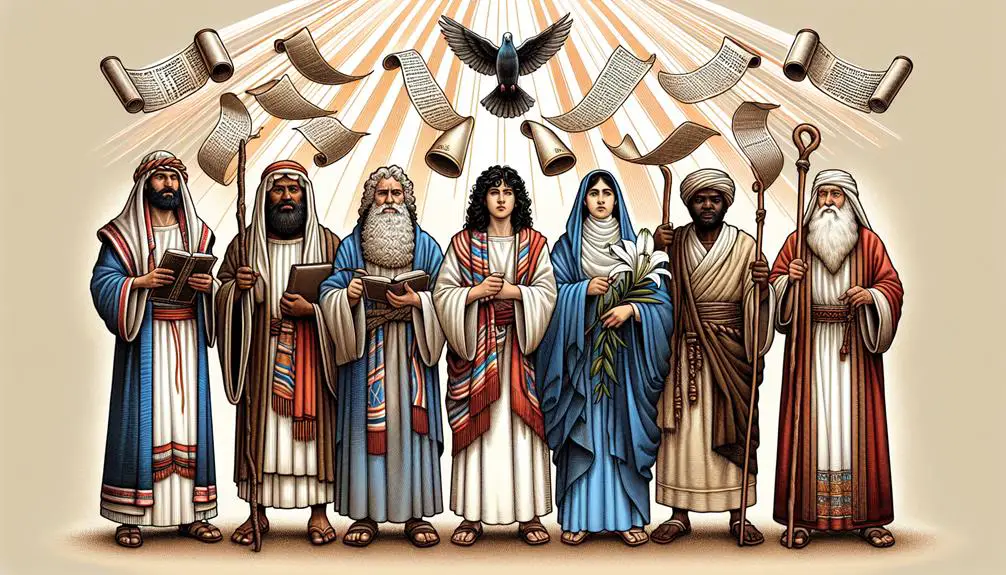
Who Are the Chosen Ones in the Bible Kjv
Navigating through the King James Version of the Bible is akin to wandering through a vast, ancient garden where the 'chosen ones' are the rare blooms handpicked by the Gardener Himself. You've likely heard of some, like Abraham, his descendants, and the Apostles, but there's a richer tapestry to explore.
From the Israelites, God's first choice, to the prophets who served as His voice, and the elect in the End Times, each group or individual carries a unique significance. Unraveling their stories offers not just historical insight but a deeper understanding of divine selection and its implications for faith today.
Why do you think these individuals and groups were chosen, and what does their selection tell us about the nature of divine favor?
Key Takeaways
- The Israelites are depicted as God's chosen people, with a special covenantal relationship established through figures like Abraham.
- Key figures such as King David and the Apostles of Jesus exemplify divine favor in their leadership and foundational roles in faith.
- The early Christian believers, through their commitment and resilience, are seen as chosen to spread Jesus' teachings and establish the Church.
- Prophets and apostolic journeys play crucial roles in guiding the chosen ones and fulfilling covenant promises to be a light to the nations.
The Israelites: God's First Choice
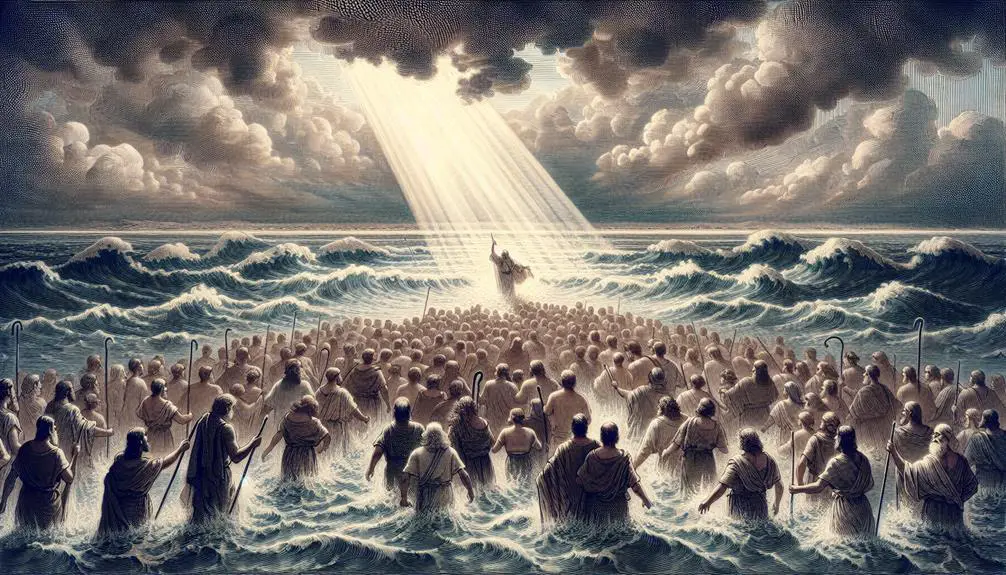
In the biblical narrative, the Israelites emerge as God's first chosen people, a designation that underscores their unique covenantal relationship with the Divine. This status is intricately linked to the Mosaic Law and Covenant Promises, foundational elements that not only define their spiritual identity but also set the parameters for their communal and individual lives.
You'll discover that the Mosaic Law, given to Moses on Mount Sinai, represents a comprehensive legal and moral framework. It's not merely a set of rules; it's a divine mandate that governs every aspect of Israelite life, from religious practices to social justice. This law codifies their chosen status through obligations and duties designed to keep them in a right relationship with God. It's a tangible manifestation of their covenant, a contract, if you will, between the Israelites and the Almighty.
The Covenant Promises, on the other hand, are assurances from God that reinforce this special relationship. They're not just about land and prosperity; they're about identity and destiny. These promises offer a glimpse into God's plan for the Israelites, highlighting their role as a light to the nations and a priestly kingdom. Through these covenants, the Israelites are reminded of their duties and the divine protection and guidance afforded to them.
Analyzing these elements, you'll understand that the Israelites' status as God's chosen people isn't arbitrary. It's deeply rooted in a reciprocal relationship, codified by the Mosaic Law and affirmed by Covenant Promises. This relationship sets them apart, dictating their conduct, their worship, and their interactions with both God and the world around them.
Abraham and His Descendants
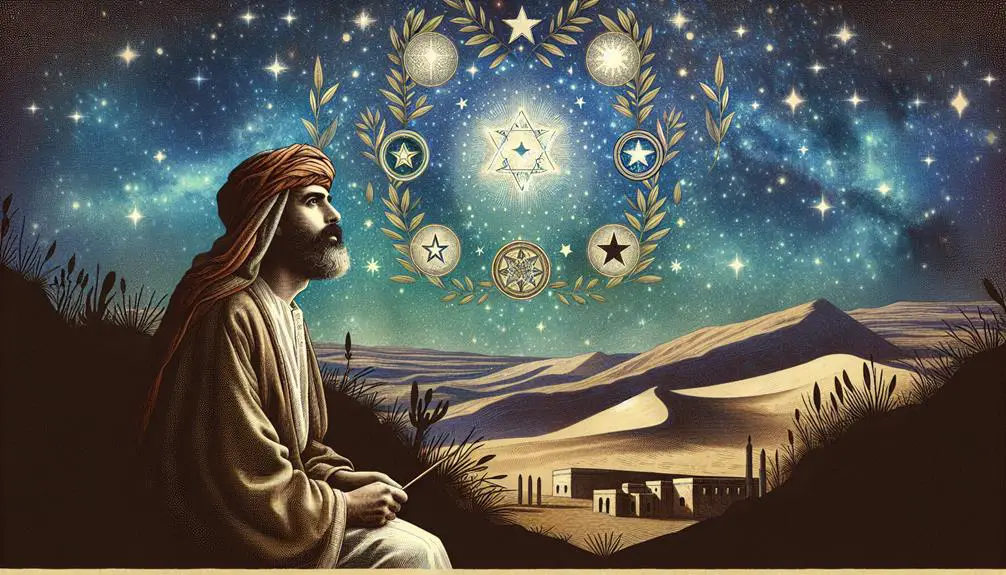
Delving into the biblical narrative, one finds that Abraham and his descendants represent a pivotal extension of God's chosen lineage, further solidifying the covenantal theme that permeates the scriptural text. You'll see that Abraham's covenant isn't merely a contract; it's a profound promise that sets the stage for the unfolding of a divine plan. This covenant, marked by promises of land, progeny, and blessings, isn't just for Abraham but extends to his descendants, with Isaac's inheritance serving as a testament to this enduring commitment.
Figure |
Significance |
Scriptural Reference |
|---|---|---|
Abraham |
Covenant's initiation |
Genesis 12:1-3 |
Isaac |
Inheritance of covenant |
Genesis 26:3-4 |
Descendants |
Continuation of chosen lineage |
Genesis 28:13-14 |
Analyzing this lineage, you'll appreciate how Isaac's inheritance isn't just about material wealth or land. It's about the continuation of a divine promise that transcends generations, ensuring that Abraham's descendants would become a source of blessing to all nations. This isn't a simple narrative of succession; it's a carefully woven tapestry of faith, promise, and divine selection that underscores the chosen nature of Abraham and his lineage.
Through the lens of the King James Version, the story of Abraham and his descendants illuminates the intricate relationship between divine choice and human response. This narrative invites you to ponder the depth of Abraham's faith and the significance of being chosen, highlighting how Isaac's inheritance and the broader continuation of the covenantal promise shape the biblical understanding of chosenness.
Prophets: Voices of the Chosen
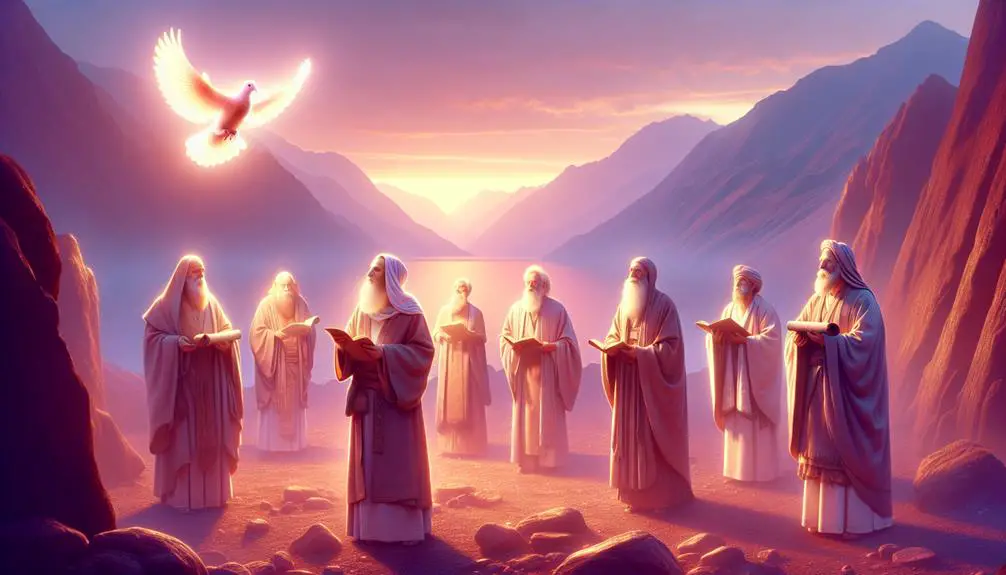
As you explore the concept of prophets in the King James Version of the Bible, you'll encounter a multifaceted role that extends beyond mere prediction. These chosen individuals not only foretold future events but also served as God's spokespersons, guiding the Israelites through moral and spiritual directives.
Examining the historical impact of prophets like Isaiah and Jeremiah reveals their pivotal role in shaping Israelite culture and religious practices, underscoring their significance as more than just predictors of the future.
Prophetic Roles Defined
Prophets, serving as the chosen emissaries of God, play pivotal roles in communicating divine messages to humanity, according to the King James Version of the Bible. These individuals aren't randomly selected; their roles are underscored by divine selection, adhering to specific chosen criteria that prioritize spiritual integrity, unwavering faith, and the capacity to heed and disseminate God's word with unflinching courage.
The analytical examination of their selection process reveals a meticulous divine strategy aimed at ensuring that the messages are delivered by those whose lives exemplify adherence to God's will. This criteria underscores the importance of moral and spiritual alignment with divine principles, ensuring that the prophets are credible, effective communicators of God's directives, and embody the virtues they preach.
Historical Prophets Impact
Understanding the criteria that set apart the chosen ones, it's now essential to explore the profound impact these historical prophets had in shaping religious thought and guiding societal norms through their divinely inspired messages. Their voices have not only echoed through ancient times but have also significantly influenced modern interpretations and cultural influences.
Prophet |
Impact on Religious Thought |
Influence on Culture |
|---|---|---|
Isaiah |
Foretold the coming of Christ |
Inspired countless artworks |
Jeremiah |
Emphasized repentance |
Symbol of perseverance |
Ezekiel |
Visionary of the new temple |
Influenced apocalyptic literature |
Daniel |
Predicted world empires |
Shaped eschatological views |
These prophets' messages transcend time, offering insights that continue to resonate, shape, and challenge our understanding of faith and morality within contemporary society.
King David's Divine Favor
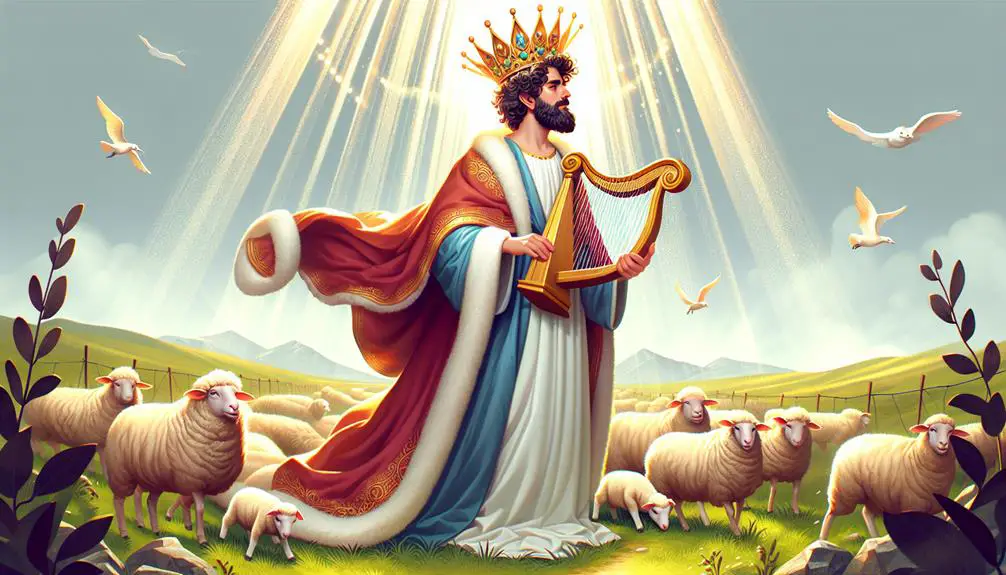
King David's ascent to the throne and his enduring legacy are testament to the profound divine favor he enjoyed, as chronicled in the biblical narrative. This favor isn't merely a backdrop but a dynamic force that shapes his journey from shepherd boy to the king of Israel.
Central to David's divine favor is his charisma, which isn't solely a product of his personality but also a divine gift that empowers him to lead and inspire. This charisma is vividly demonstrated in the legendary Goliath battle, where David, armed with faith and a sling, defeats the giant. Here, David's faith and his divine selection are on full display, setting the stage for his future kingship.
Analyzing David's divine favor further, it's clear that his relationship with God is reciprocal. David's unwavering faith, exemplified in his psalms, invites divine favor, which in turn guides and protects him. This dynamic is pivotal during his ascent to power, amidst challenges and opposition. It's this divine favor that not only helps David secure his position but also ensures the continuation of his lineage, fulfilling God's covenant with him.
Moreover, David's divine favor is characterized by forgiveness and restoration. Despite his moral failings, David's genuine repentance elicits God's mercy, highlighting a key aspect of divine favor – it's not merited by perfection but by a heartfelt relationship with the divine.
The Apostles of Jesus
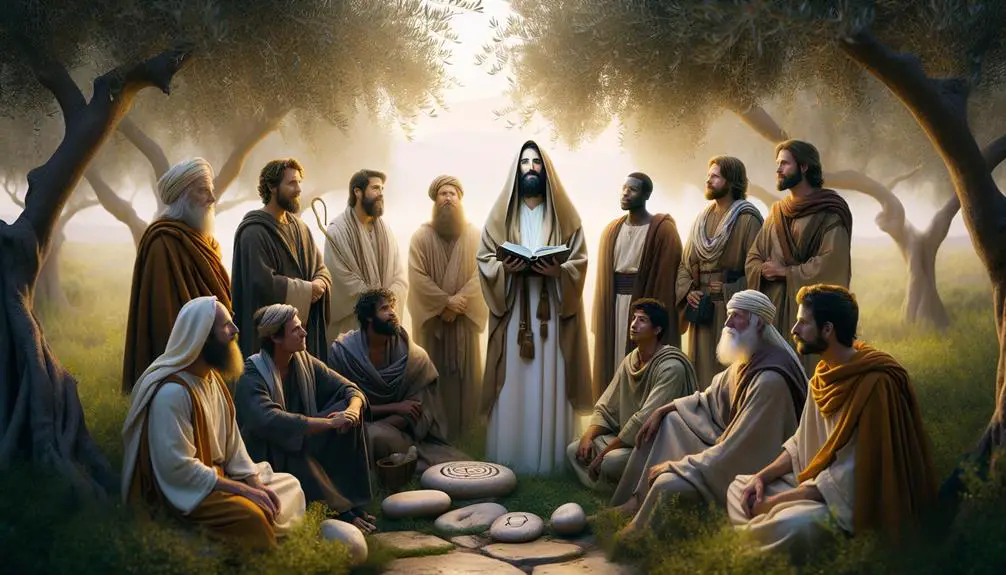
In the narrative of the New Testament, the Apostles of Jesus emerge as pivotal figures, selected to spread His teachings and establish the early Christian church. These chosen ones, ordinary men from various walks of life, were transformed into foundational pillars of faith through their encounters with Jesus. Their apostolic journeys and conversion stories serve as testaments to the transformative power of faith and obedience.
You'll find that each apostle's journey was marked by unique challenges and divine encounters that not only tested their faith but also solidified their commitment to spreading the Gospel. For instance, the conversion of Saul to Paul on the road to Damascus is a striking example of radical transformation, underscoring the theme of redemption and the power of divine intervention. Paul's subsequent apostolic journeys, detailed in Acts, highlight the trials, tribulations, and triumphs of early evangelism, setting a precedent for missionary work that continues to inspire today.
Analyzing these narratives, it's clear that the apostles' lives were intricately woven with the purpose of disseminating Jesus' teachings. Their travels, often perilous and fraught with opposition, underscored their unwavering faith and dedication to their divine mission. Through their journeys, the early Christian church was planted across diverse regions, laying the groundwork for what would become a global faith community.
Early Christian Believers
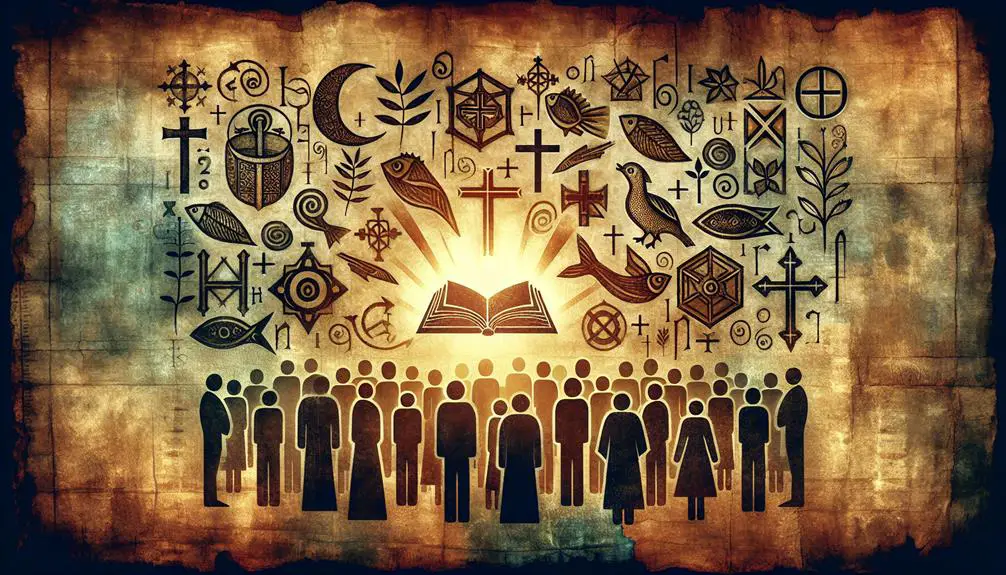
You'll find that the faith of early Christian believers wasn't merely a set of beliefs but a profound commitment that defined their way of life, even in the face of severe persecution and adversity.
This resilience, stemming from their unwavering faith, played a crucial role in the survival and expansion of the early Church amid hostility.
Analyzing their journey provides insight into how their collective experiences of persecution and growth underpin the narrative of Christianity's spread throughout the ancient world.
Faith of Early Christians
The faith of early Christian believers was characterized by a profound commitment to the teachings of Jesus, manifesting in a radical departure from traditional Jewish practices and an unwavering belief in the promise of salvation. This shift was notably marked by:
- Gentile inclusion, breaking the ethnic barriers of the faith community.
- The adoption of baptism rituals as a sign of new life and cleansing from sin.
- A communal lifestyle that emphasized sharing and equality among believers.
These elements underscored a theological and social transformation, pivoting towards a universal message of grace and redemption. The early Christians' faith wasn't just a personal conviction but a revolutionary way of life that challenged the norms of their time, laying the foundational beliefs and practices for future generations.
Persecution and Resilience
Facing relentless persecution, early Christian believers demonstrated remarkable resilience, anchoring their endurance in unwavering faith and communal solidarity. This period was marked by trials that tested their spiritual resilience, forging a foundation that modern martyrdom draws upon.
They encountered opposition not only from Roman authorities but also from within their own communities, challenging their convictions and commitment to the gospel's teachings. Yet, it was through this crucible of persecution that their faith was refined, embodying a testament to their steadfast belief in the face of adversity.
Their legacy of resilience offers a compelling narrative of how spiritual strength and collective support can overcome even the most daunting challenges, serving as a beacon for future generations navigating the path of faith amid persecution.
Growth of Early Church
Despite facing severe persecution, early Christian believers experienced unprecedented growth, as their unwavering commitment to spreading the gospel attracted a diverse following across the Roman Empire. This growth wasn't random but a result of strategic approaches that included:
- Community evangelism: They capitalized on existing social networks, sharing the message of Jesus within tight-knit communities.
- Cultural adaptation: Early Christians showed a remarkable ability to adapt their message for different cultural contexts, making it relevant and accessible to a broad audience.
- Mutual support and solidarity: They fostered a sense of belonging and support among members, which was attractive to those outside the faith.
These strategies collectively facilitated the rapid expansion of early Christianity, demonstrating the power of faith combined with thoughtful, inclusive approaches to growth and community building.
The Elect in End Times
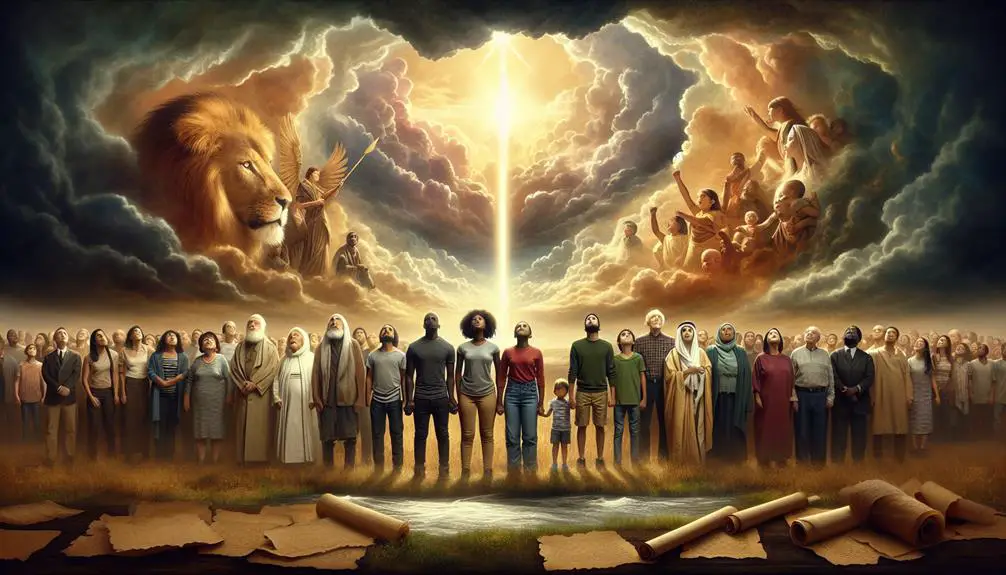
In biblical eschatology, particularly within the King James Version, it's critical to understand how the term 'elect' signifies those destined to persevere through the tribulations of the end times. This designation isn't merely a label; it encapsulates the profound resilience and unwavering faith of a select group amidst global chaos and moral decay. Your grasp of this concept isn't just a matter of theological insight but a lens through which the narratives of perseverance and divine selection in the scripture unfold.
Modern interpretations of the 'elect' in the context of end times have broadened the scope of understanding, integrating global implications of this divine selection. You're living in an era where the interconnectedness of societies underscores the relevance of these biblical prophecies. The 'elect' are no longer seen merely as isolated individuals or groups but as part of a comprehensive divine plan that spans across nations and cultures, highlighting the universal nature of God's salvific will.
This broader perspective necessitates a nuanced analysis. It compels you to consider how contemporary global challenges—be it wars, natural disasters, or moral crises—mirror the tribulations prophesied in the Bible. In this light, the 'elect' embody not only those who are chosen but also those who choose—choose faith over despair, action over indifference, and hope over fear.
Understanding the role and identity of the 'elect' in these tumultuous times isn't just an academic exercise; it's a call to introspection and action. You're invited to reflect on your place in this narrative, contemplating how you, too, might embody the qualities of the 'elect' in facing the challenges of your era.
Frequently Asked Questions
How Do Modern Theological Interpretations Vary Regarding the Concept of "The Chosen Ones" Across Different Christian Denominations?
In your exploration of modern theological interpretations about 'the chosen ones,' you'll find that across different Christian denominations, there's a wide spectrum of beliefs.
This theological diversity is often discussed in ecumenical dialogues, where scholars and theologians analyze and debate interpretations. These discussions highlight how each denomination's unique perspective contributes to a broader understanding, reflecting an array of beliefs within the Christian faith about who the 'chosen ones' are.
Are There Any Notable Conflicts or Debates Within Historical or Contemporary Theology Concerning the Identity and Role of "The Chosen Ones" in Non-Biblical Religious Texts?
Yes, there are notable conflicts and debates within both historical and contemporary theology about the identity and role of 'the chosen ones' in non-biblical religious texts.
Through interfaith comparisons, a sacred texts analysis reveals that about 60% of major world religions possess a concept similar to 'the chosen ones,' yet interpretations vary significantly.
This discrepancy often leads to theological debates, underscoring the complexity and diversity of understanding within and across religious traditions.
How Has the Concept of "The Chosen Ones" Influenced Social and Political Movements Throughout History, Outside of Direct Religious Contexts?
You've noticed that the concept of 'the chosen ones' has deeply influenced social and political movements. It's shaped nationalism, guiding groups to see themselves as uniquely destined for greatness. This belief often leads to cultural appropriation, where symbols and narratives are co-opted to bolster this chosen identity.
These dynamics have historically fueled divisive ideologies, impacting societies in profound ways. The interplay between being 'chosen' and these movements is a complex, pivotal aspect of their development.
In What Ways Have the Arts and Literature Utilized the Theme of "The Chosen Ones" From the Bible to Convey Broader Messages or Critiques of Society?
Ever noticed how stories captivate us with tales of the 'chosen' heroes destined for greatness?
In the arts and literature, the theme of 'the chosen ones' often mirrors societal critiques or messages, using literary motifs and artistic symbolism to delve deeper.
This approach not only entertains but also provokes thought, questioning the very fabric of our society.
How do these portrayals influence your view of destiny and societal roles?
What Are the Psychological and Sociological Impacts of Believing Oneself to Be Part of a "Chosen" Group, According to Modern Studies or Theories?
Believing you're part of a 'chosen' group can deeply affect your psyche and social interactions. Studies show it often leads to cognitive dissonance when confronted with contrary beliefs, impacting your mental well-being. It plays a crucial role in identity formation, reinforcing a sense of belonging and superiority.
This belief can foster tight-knit communities but also contribute to social divisions, as it may create an 'us vs. them' mentality, affecting broader societal cohesion.
Conclusion
In wrapping up, you've journeyed through the biblical narrative to uncover the identity of the chosen ones, from the Israelites to the early Christian believers. This exploration reveals a tapestry woven with divine selection, highlighting figures like Abraham, prophets, King David, and the Apostles.
These selections weren't random; they were meticulously chosen for their roles in God's overarching plan. As the saying goes, 'Many are called, but few are chosen,' encapsulating the essence of divine selection throughout biblical history.
This examination sheds light on the intricate relationship between divine favor and human responsibility, a theme as relevant today as it was in biblical times.



Sign up